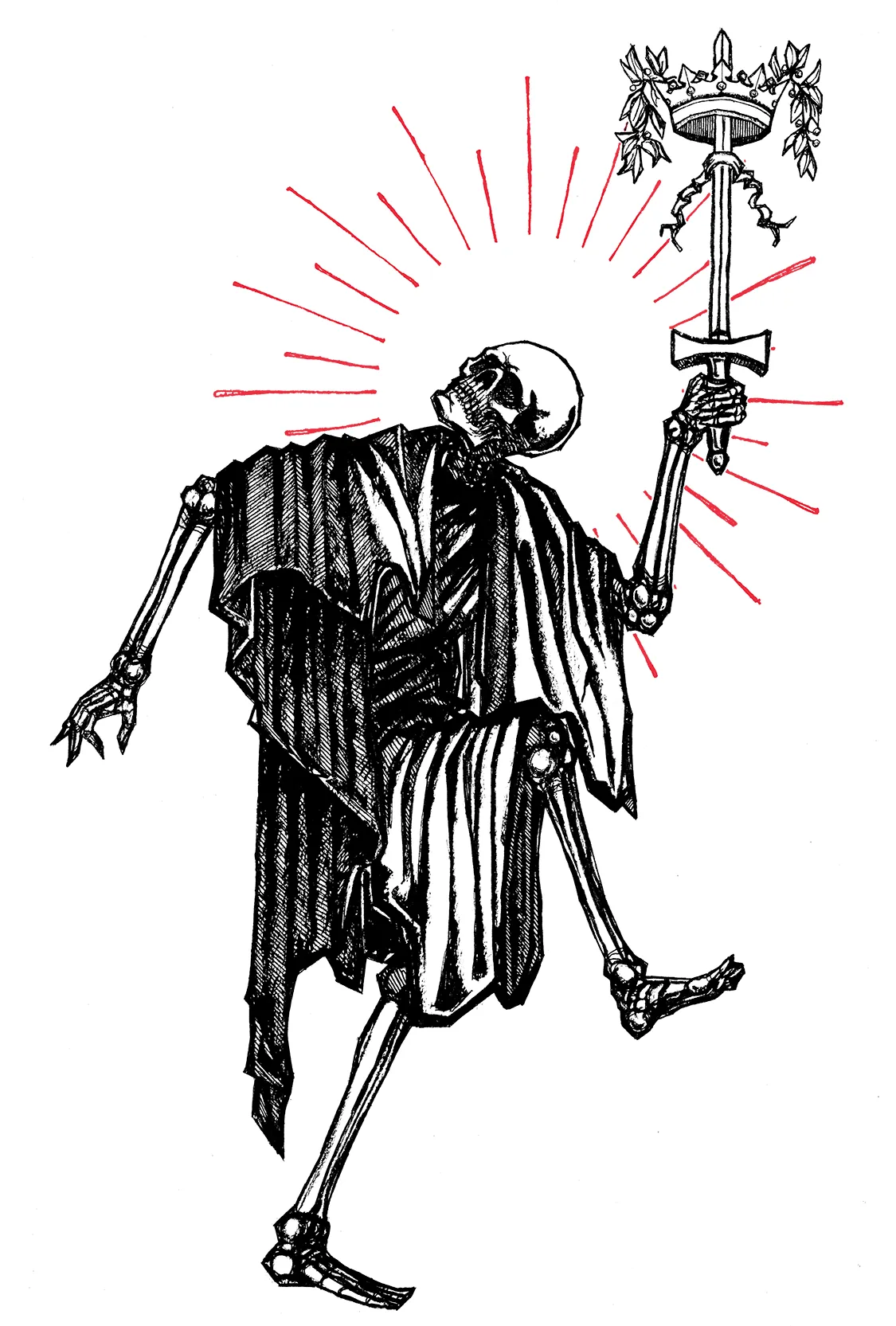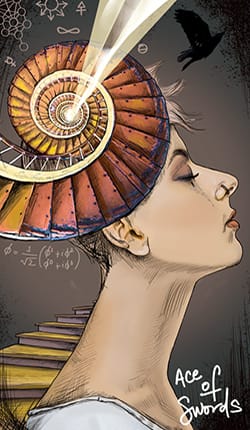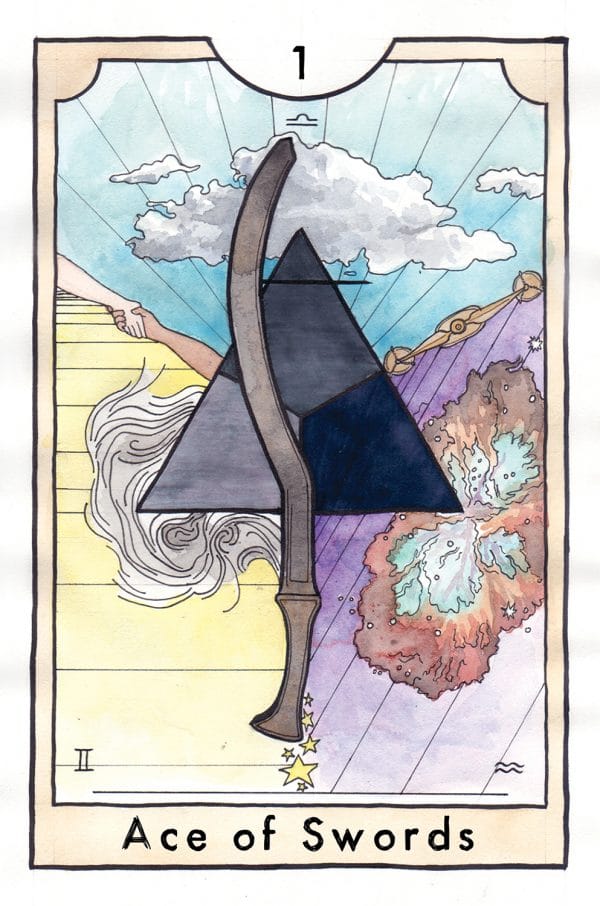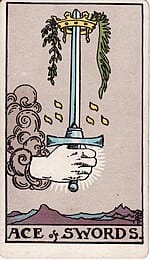Ace of Swords (and a fun new thing)
Put up or shut up. If you’re going to talk the talk, you better walk the walk. Put your money where your mouth is. These are the lessons (warnings) of the suit of swords.
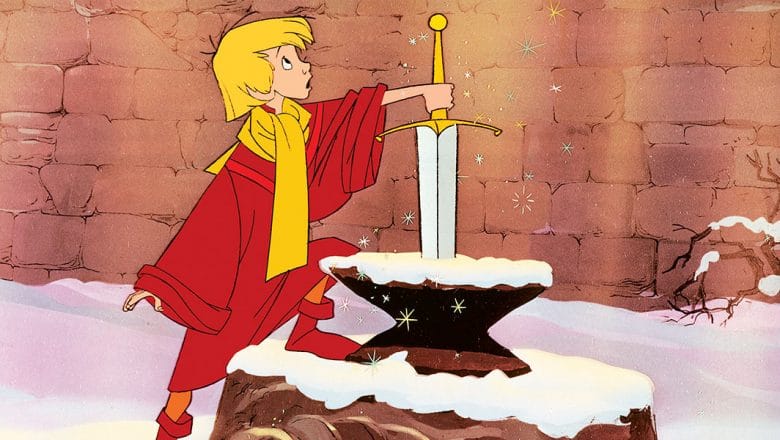
QUICK NOTE: Happy New Year, Witch's Markheads (is this a thing? I'll workshop it). Before I get into the Ace of Swords, I wanted to let you know that I'm going to be offering tarot readings for a few readers (I'll probably cap it at ten, but we'll see, maybe it'll be so fun I'll have to do more) that I will publish on Witch's Mark. We can see together how the cards tell a story, how the meanings of cards change depending on their position in the spread, or what cards surround them. If you'd like to ask me a question to be answered by the tarot, please send me an email at WitchsMarkEli@gmail.com. Please include: your question, how you would like me to refer to you in the newsletter (first name only? alias? identifying characteristics but no name? Your choice). I will print your question at the beginning of the newsletter, so know that going in.
I find that the best kinds of questions are open-ended rather than yes or no. Rather than "Does x love me?" you might ask instead, "What actions can I take to move my relationship with x forward?" You can ask a question about anything – creative projects, relationships, career decisions, family, or even just "What should I be focused on in the coming year? What does 2025 look like for me personally?" Anyway, I think it will be fun, and I hope that some of you take me up on this! And now, onto the Ace of Swords:
Swords are associated with the element of Air, which represents the conscious, rational, thinking mind. Over the course of the suit, Swords tell a story of conflict, clarity, truth, and communication. On their good days, swords are about facing reality, finally breaking through, bursts of clarity, and standing up for what’s right. At their worst, these cards can be obstinate, unmoving, pig-headed, and bad collaborators. Communication is tricky, misunderstanding is easy, and we’ve all got a million defenses built up around the truth.
Put up or shut up. If you’re going to talk the talk, you better walk the walk. Put your money where your mouth is. These are the lessons (warnings) of the suit of swords.
Like all Aces, the Ace of Swords embodies all of the qualities of the suit. Also like all aces, the Ace of Swords means “yes” in its most basic terms. Whenever I get the Ace of Swords, I think of it as an invitation to tell the truth, to be brutally honest with myself and others, and to cut to the chase. In that way, the Ace indicates a breakthrough and a moment of clarity, but breakthroughs are not always achieved without suffering. Sometimes, it hurts to grow.
I’m writing this missive at the beginning of a brand new year. On the one hand, calendars are man-made and arbitrary. There is nothing particularly new about a new year, and yet, the collective turning of a page feels like an energetic wave that can be ridden toward personal growth. I like the ritual of resolutions and the optimism (and harmless delusion) represented in our collective desire to constantly exist in a state of becoming.
Anyone who traffics in resolutions knows that there are public facing resolutions and private resolutions. Public resolutions are designed to showcase self awareness, to indicate that you understand your own flaws and that you seek to better yourself. Public resolutions are shared to create a sense of community (hey, we’re all working on something), but they also broadcast your values. This year I’m resolving to read more, or this is the year I quit buying things on Amazon and start composting. These are lovely resolutions, but they are the equivalent of the answer “I think sometimes I just care too much” to the question, “What is your biggest weakness?”
My public facing resolutions are always things I care about, things I hope to achieve — creating better boundaries, healing my relationship to people pleasing, being more patient as a mother, learning when to rest. But in the Ace of Swords spirit of honesty, it’s time that I admit that I’ve had the same private resolution every year since I was eleven years old.
For the last almost three decades, I’ve entered January with the resolve to shrink, tighten, elongate, beautify, or put more simply: get thin. How thin? As thin as you can possibly imagine, the limit does not exist. If people were worried about how thin I am, then maybe I could relax. Every year since I was eleven years old, the secret pulsing solipsistic chant in the back of my brain has urged me, in spite of science, my values, and decades of experience, to manifest a body that I have never ever had.
It feels appropriate to begin 2025, the year I will turn forty, with enough mental clarity to face the difficult truth: this resolution has never come true because it is stupid, vain, and impossible. Above all else, this resolution is rooted in unconscious patriarchy, white supremacy, and also… it’s profoundly boring.
Don’t get me wrong: this drumbeat in my skull probably isn’t going anywhere. I, a woman who was born in 1985, experienced childhood in the nineties, came of age in the early aughts, and was a fucking child actor, may never be able to fully shed the desire to shrink. My body image shit is deeply engrained, a voice in the back of my head that has been there as long as I can remember.
Thinness is a siren song, an elusive competition every woman is entered into without her consent at birth. Thinness is separate from beauty— thornier, more malicious and dangerous. Beauty is subjective, celebratory, influenced by affection, humor, and experience. Thinness is about conquering desire, the execution of will, the discipline to refuse pleasure. Beauty is in the eye of the beholder, but thinness is measurable and culturally associated with moral superiority in a deeply fucked up way.
This year, in an effort to be honest with myself, I will not pretend that thinness didn’t cross my mind when the clock struck midnight. I will not pretend that I did not imagine a future self who has risen above the desires of the body to become a taut goddess and ruler of men. These thoughts crossed my mind as they do every year. I’ve come to expect them. But this year, I’m being honest with myself and with you, the Internet, about what this desire is really about.
Like most limiting beliefs, my desire to shrink began in childhood. I was, as has been previously reported, a child actor. I was measured, fitted, and photographed constantly by adults. At twelve years old, a costume assistant zipped me into a dress I’d worn a year earlier and remarked, “Someone’s been eating cookies.” This moment is seared into my brain as if by branding iron. I can recall exactly where I was, the color of the carpet, the itchy stifling wig I was wearing, the heat that leapt immediately to my face. An adult compared my 12 year old body to my 11 year old body and instead of assuming I had done what children do naturally — grow — she tossed off this jab that I can recall as a sense memory nearly thirty years later. I do not remember the woman’s name but I can still taste that shame on my tongue.
As a child actor, I was professional and precocious, a mini adult. Thinness, therefore, is inextricably linked in my brain with a desire to be small. Small things are protected. Small things are precious. Small things are babied and cared for. Small things are allowed to make mistakes, to be silly, to play. I want to be small because I want to be cared for, I want to be allowed to make mistakes. I want to be offered grace.
In my big beautiful family — garrulous, hilarious, lovable, and brilliant, all of them — food was not emphasized, alcohol was. Alcohol was an acceptable cheat code to pleasure, but food was sort of beside the point. My paternal grandmother was beyond thin her entire life — I’m not sure she was ever above one hundred pounds, except maybe in pregnancy (she had seven children), but it’s pretty hard for me to imagine. Her relationship to her body (and to mine) seeped into my subconscious early, in part because she made a lot of comments about my body. I don’t think she was being intentionally hurtful (though it did hurt), but thinness was the air she breathed. How could it not be? She was a young woman in the era of Mad Men, where women were to drink martinis, smoke cigarettes, and eat like birds (only if absolutely necessary).
I don’t need to litigate the influences that led to my own complicated relationship to my body. It’s boring, and it’s beside the point. I’m going to turn forty this year. It’s time to get the fuck on with it. So my Ace of Swords moment, my breakthrough, is this: I refuse to spend this year trying and failing to disappear. I acknowledge that desire as a warped fantasy of a child’s mind. I did not understand how the world worked or that other people had complicated relationships with their bodies too. I felt like the only person in the world who had ever felt weird in her own skin, and the only idea I had to fix it was transformation.
That idea wasn’t mine, of course. It was an external thought, implanted in my brain by adults, magazines, television, capitalism, my peers, boys, America. And because it is not my thought, it’s time to release it.
Here’s my other Ace of Swords breakthrough: whenever I am feeling panicky or uncertain, when I am on the precipice of a creative insight, or something is weighing on my soul, I use my obsession with thinness to disassociate. When I’m stressed, I’ll take an insanely long hike and spend the entire time doing mathematical equations in my brain — if I lose two pounds per week, it will take me x amount of weeks to be Heidi Klum, etc. This is a coping mechanism. It’s not even about my body. Sometimes the brain just likes to play the fucking hits, you know? Even if you’ve outgrown them.
Though this refrain in the back of my skull may seem like a pentacles issue – pentacles focus on concerns of the material world and the body – in fact, this internal conflict is all swords. I use this punishing mental torture to distract myself from other truths, to think about something that I imagine is in my control, something that comforts me in its familiarity even while it tears me down.
Who wants to think about mortality or the thornier side of relationships? Who wants to spend their time being honest with themselves about their relationship to external validation and accomplishment? Who wants to dive deep into the darkness at the center of them? Wouldn’t it just be easier to punish the body into submission? Wouldn’t it be easier to berate yourself, and focus all of your attention on an elusive goal that, in spite of the reality, feels like it is just out of reach?
This is the year that I will do my best to disrupt that thought pattern when it comes up. This is the year that I will question what the fuck is actually going on when my brain starts planning to throw out every delicious food item in my house and replace it with flaxseed. This is the year I will try my best to stop, take a deep breath, and be curious about what is actually going on.
I loved my grandmother deeply. She was a fascinating, brilliant woman with sharp edges and a sense of humor. She was fiercely protective of her family and she was insightful and curious all the way to the end. She lived an amazing life, filled with love and friendships and adventure. I hope that there were moments when she let herself go, when she enjoyed the pleasure of the taste of something sweet on her tongue. But I don’t know if she did, if I’m being honest. I think she found joy in other things, but from my observations, food was a pleasure she did not allow herself.
When I reach my crone years, I refuse to define myself by my shell. I want to embrace the humanity and mortality of my skin, my hair, the shape and reality of me. Who gives a shit, you know? (Me, of course, me, I do, but I’m working on it). I am a lot of things, as complicated and thorny as the women who came before me, and it’s time to stop distracting myself with bullshit. I’ve got work to do.
